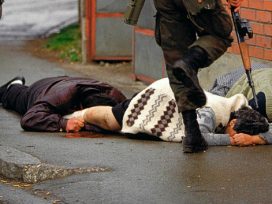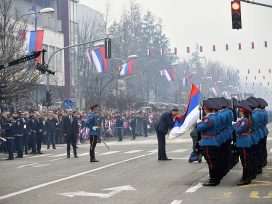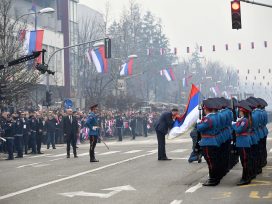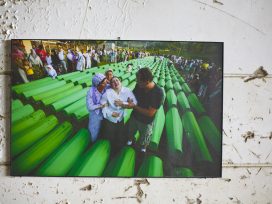There is a memorable photo of Biljana Plavsic visiting Bijeljina in the early spring of 1992. She arrived there just after war criminal Zeljko Raznatovic Arkan and his Tigers “freed” this Bosnian town from Muslims by killing them. Plavsic came to congratulate him. Elegantly dressed as usual, with freshly done hair and in high heels, she cordially embraced Arkan and kissed him. She literally had to step over bodies lying on the pavement around her.
Judging from the photo, she did not mind doing that at all.
Plavsic is a Sarajevan professor of biology, a student of the University of Zagreb, a fulbright scholar, a scientist with a large body of publications, a lady of fine manners, who speaks several foreign languages. A high-ranking politician during the war, that very lady had a habit of calling the murder of Muslims a “natural thing”. Kissing Arkan in Bijeljina was just an expression of gratitude for a job well done.
Now, after serving two thirds of her 11-year sentence in the Hinseberg prison in Sweden, Biljana Plavsic is free. By repenting in a quite spectacular way, she got only 11 years for crimes against humanity. She thus avoided the charge of genocide, which would have instead brought her up to 25 years in prison. The judges of the International Criminal Tribunal for the Former Yugoslavia took her repentance seriously, hoping that it could influence others awaiting trial. It looked like a brave and moral gesture from a person who understood her crime and who – as she said – wanted to spare the Serbian people from collective guilt by admitting her own.
But it turned out that her behaviour was far from guided by moral or religious concerns. Plavsic’s real intention was revealed this spring in an interview she gave to the Swedish magazine Vi. She cynically explained that her “confession” was nothing but a staged farce. The fine-mannered, educated professor deliberately lied in order to get a lenient sentence. She did not repent at all.
This hypocritical performance makes Plavsic’s behaviour even worse than that of Radovan Karadzic, whom she called a “coward” and a “gangster” in the interview. It is astonishing that such a lady could complain about life in prison, saying that “none of the other inmates had read a single book and yet we were all treated as equals”. As if the fact that she is educated should have given her a higher status. One is tempted to ask: how come that all these books she had read played no role when she passed racist judgments on Muslims? However fine and educated she likes to think herself, she is nevertheless guilty of some of the most terrible crimes committed in Bosnia during the war – and therefore, surely, a much bigger criminal than any of her fellow inmates at the Hinseberg prison. Again and again, it is proven that education is no guarantee of higher moral standards. Radovan Karadzic, too, is not only an educated man, but also a poet; as is Edward Limonov, who shot at Sarajevo from the hill above the city.
Years ago, in my book They would never hurt a fly, I wrote about Biljana Plavsic as a positive example of a woman who had the courage to admit her wrongdoings during the war. I admired her, because such an act demanded great courage and moral stamina. In my view she also taught a lesson to the Balkan man in hiding: men like Karadzic, Mladic and Gotovina.
I was terribly wrong.





